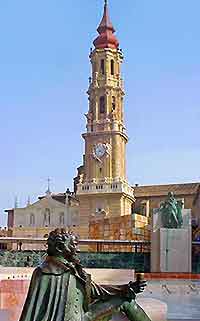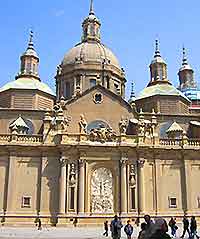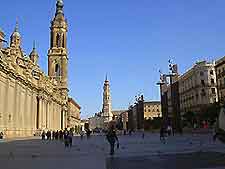Zaragoza Life and Visitor Travel Tips
(Zaragoza, Aragon, Spain)

Many people make the mistake of passing through the city of Zaragoza, on the way to
Madrid and
Barcelona, however Zaragoza has an enormous amount to offer visitors.
With an array of museums, art galleries, theatres, shops and top restaurants, Zaragoza is an important university city, with approximately 50,000 students and a number of faculties in the very heart of central Zaragoza.
Zaragoza offers an array of tourist attractions for visitors to the city, with plenty of travel tips and advice available at the central tourist information offices and bureaus. Hotel concierges are always happy to assist with planning your stay in Zaragoza and many sightseeing leaflets are often available in hotel foyers.
Much of city life in Zaragoza is based around the historic city centre, known locally as the 'Casco Viejo', where you will find many historical buildings, palaces and churches.
Tourism and Tourist Information (Oficinas de Turismo)
A selection of tourist information offices can be found in Zaragoza, both promoting tourism in the city and the surrounding area. Zaragoza's tourist bureaus offer a wealth of travel tips and advice, together with leaflets and brochures about top attractions, events listings and up-to-date information about local fiestas, accommodation booking and in-depth city maps. One of the most historic tourist bureaus in Zaragoza, the Torreón Tourist Office is actually located inside a 15th-century Mudéjar tower, alongside the famous Roman Walls.
Officina de Turismo de Aragon
Address: Avenida de César Augusto, Zaragoza, Aragon, Spain
Tel: +34 902 477 000
Open hours: Monday to Friday - 09:00 to 14:00 and 17:00 to 20:00, Saturday and Sunday - 10:00 to 14:00
Plaza de Pilar Tourist Office
Address: Plaza de Pilar, Zaragoza, Aragon, Spain
Tel: +34 976 393 537
Open hours: daily - 10:00 to 20:00
Torreón Tourist Office
Address: Gloriata de Pio XII, Zaragoza, Aragon, Spain
Tel: +34 976 201 200
Open hours: January to April, daily - 10:00 to 14:00 and 16:30 to 20:00; May to December, daily - 10:00 to 20:00

Language
Spanish is the third most widely spoken language in the world, following Chinese and English. Although Spanish is the main language in Zaragoza, English, French and German are often understood at most sights, hotels and restaurants, with menus often provided in several languages. Castilian Spanish is the official language, although in the surrounding regions, Basque, Catalan and Galician are spoken. When venturing outside of Zaragoza, a phrase book can be extremely helpful.
Tipping
Tipping is quite discretionary in Zaragoza, with taxi drivers often being pleased to receive a tip 5% or more, although this is by no means compulsory. Restaurants always include service charges by law and these should be clearly shown on the menus, although a tip will still be expected and very much appreciated. Hotel staff, such as luggage handlers, happily accept a small tip, which may be as little as a Euro. Generally, no other public service workers in Zaragoza expect tips. You should always pay tips in cash, to be sure that the person it is intended for receives it fully.

Places of Worship
The national religion of Zaragoza and throughout Spain is Roman Catholic, although a range of other faiths and religious beliefs are also present in Zaragoza, including Protestants and Muslims. There are a vast selection of churches and chapels that welcome visitors and these often operate fairly formal dress codes. Zaragoza's Basilica del Pilar (El Pilar Cathedral) is actually the biggest Baroque-style church in the whole of Spain.
Smoking
January 2006 saw the passing of a major law actively enforcing the rights of non-smokers throughout Spain and many public buildings in Zaragoza are now completely smoke-free. Visitors to Zaragoza often choose to either smoke outside or in designated areas, where others are already smoking. In general, offices, restaurants, and venues for children restrict smoking, together with all modes of public transport.
Tips for Using the Euro
The Euro is made up of eight coins and seven paper notes and was introduced on January 1, 2002. The 12 original members of the European Union - Austria, Belgium, Finland, France, Germany, Greece, Ireland, Italy, Luxembourg, Netherlands,
Portugal, and Spain - planned the event for many years in advance, deciding upon a specific conversion rate for each country's national currency. The colourful Euro bills, which include holograms and shades of green, yellow, blue, mauve, and orange, are identical throughout Europe. Coins have one common and one national side, but they can be used in any of the member countries, regardless of the country of issue. Old currencies are no longer accepted as legal tender, although major banks will happily convert them into Euros.
Telephones and Emergency Numbers
- Emergencies in Zaragoza - for police dial 091 (national) or 092 (local)
- For fire emergencies in Zaragoza - dial 080 or 085 and for an ambulance dial 409 5530
- To call from one city code to another in Zaragoza- first dial '0' followed by the Spanish city code and the main telephone number
Safety
One of the biggest security threats in Zaragoza are bag snatchers and pickpockets, who have become skilled and fast. Be aware of people brushing past or bumping into you on busy streets in central Zaragoza, consider wearing handbags and cameras across you body, and use a discreet money belt if possible. Always park your car in hotel parking areas, or in well-lit streets or safe places, and avoid leaving any valuables inside.
Taxes
VAT (IVA) is always included in the price and refunds are unusual in Zaragoza and throughout Spain. Tourists visiting this city from countries outside of the EU can only claim a refund on this tax if the item was purchased for personal use and cost more than a certain amount. Shopkeepers in Zaragoza can provide further details if required.
 Many people make the mistake of passing through the city of Zaragoza, on the way to Madrid and Barcelona, however Zaragoza has an enormous amount to offer visitors.
Many people make the mistake of passing through the city of Zaragoza, on the way to Madrid and Barcelona, however Zaragoza has an enormous amount to offer visitors.
